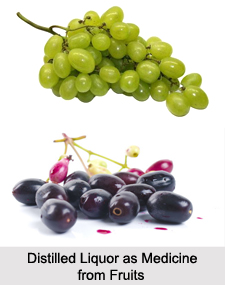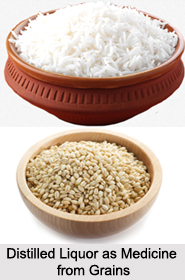 All fermented and distilled liquors causing intoxication, are called "Madya" or "Madira" in Sanskrit. The following varieties which were used as medicine are mentioned by the Sanskrit writers:
All fermented and distilled liquors causing intoxication, are called "Madya" or "Madira" in Sanskrit. The following varieties which were used as medicine are mentioned by the Sanskrit writers:
•Maddhika or spirit distilled from grapes.
•Kharjura or spirit distilled from dates.
•Gaudi or spirit distilled from treacle.
•Sidhu or spirit distilled from sugarcane juice.
•Sura or spirit distilled from rice of red colour.
•Kohala or spirit distilled from barley.
•Madhulika or spirit distilled from wheat.
•Paishti or spirit distilled from different sorts of grain.
•Madhuka pushpottha or spirit distilled from the flowers of Bassia latifolia and treacle.
•Jambava or spirit distilled from the ripe fruits of Eugenia Jambolana.
•Kadambari or spirit distilled from the flowers of Anthocephalus Cadamba.
•Valkali or spirit distilled from Belleric myrobalan and treacle.
•Varuni is the fermented juice of the palm and date trees.
•Akshiki or spirit distilled from rice with the addition of the bark of Terminalis Bellerica.
•Sveta means liquor from rice of white colour.
•Moireya or a sort of spirituous liquor from the blossoms Lythrum frutecosum with sugar, etc.
•Arishta, Vinous spirit or more properly Tincture of drugs.
•Ashaba, Vinous or fermented liquor from sugar or molasses, Rum.
•Prosanna is the clear upper portion of sura. According to some it is liquor distilled from rice with the addition of medicinal herbs.
Benefits of Distilled Liquors
Spirituous liquors are described as stimulant, sedative, agreeable, heating, intoxicating, digestive and nourishing. They are easily assimilated but injurious to health in hot climates. New liquors are disagreeable to the taste and smell, unpleasant in its effects, not easily assimilated, laxative, heating and injurious to health. Old liquors are agreeable, light and appetizing. It promotes the circulation of the fluids in the vessels and renders the senses acute. Medicinally, spirituous liquors are said to be useful in emaciation, debility, anaemia, urinary diseases, dyspepsia, chronic bowel complaints, chronic fever, deficient secretion of milk, etc.
Dose of Distilled Liquors in Medicine
A mixture of ginger, cumin seeds, treacle, wine and warm water is given in prolonged cold stage. Several preparations of spirit distilled from treacle with the addition of various medicinal and aromatic substances are used in different diseases.
Mritasanjivani Sura: Take new treacle 800 tolas and steep it in 30 times its weight of water. Add to the mixture the following substances in the form of a paste, namely, ginger 16 tolas, bark of Acacia Arabica 2 seers, of Ziziphus Jujuba (kola) 2 seers, of Symplocos racemosa (lodhra) half a seer, betel nuts as many as desired; stir in a large earthen vessel, and keep the mixture for 20 days in a covered jar. After this period, remove the fermented fluid to a distilling apparatus, and add to it the following aromatic substances, namely, betel nuts, cloves, sandal wood, cumin seeds, ajwain, black pepper, ginger, nutmegs, cardamoms, cinnamon, tejapatra leaves, fennel seeds, nigella seeds, the fragrant substances called elavaluka, padma-kashtha and granthiparni, devadaru wood, khas khas root, zedoary root, Jatamansi root and the tubers of Cyperus rotundus (mustaka), each 8 tolas in coarse powder and distil. This distilled liquor is used as a tonic and astringents.




















